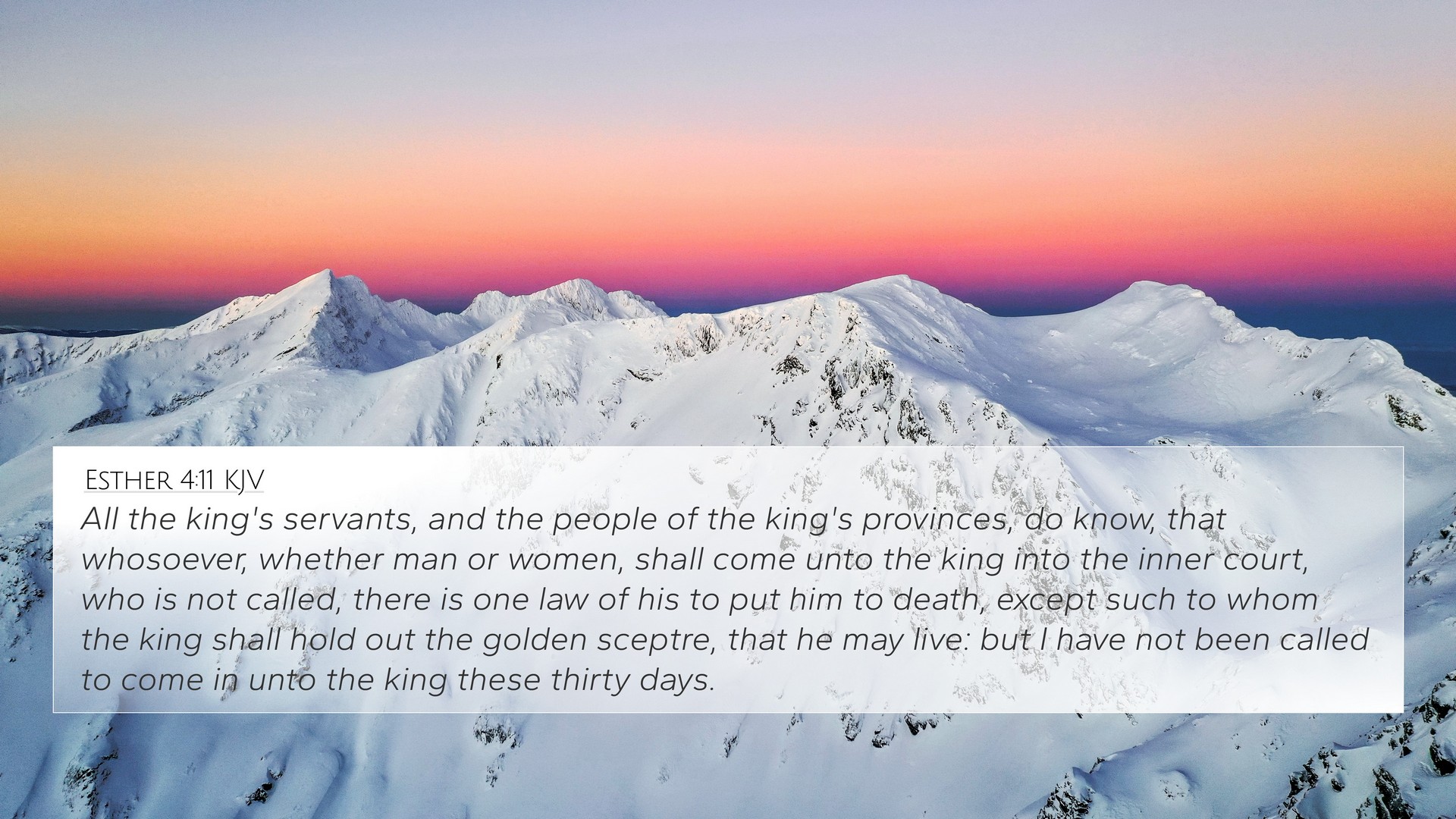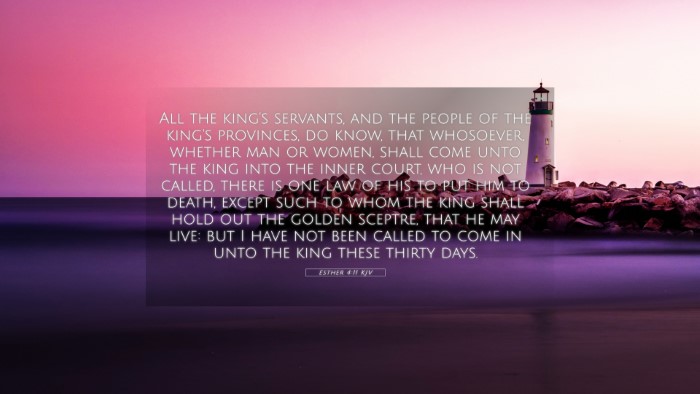Old Testament
Genesis Exodus Leviticus Numbers Deuteronomy Joshua Judges Ruth 1 Samuel 2 Samuel 1 Kings 2 Kings 1 Chronicles 2 Chronicles Ezra Nehemiah Esther Job Psalms Proverbs Ecclesiastes Song of Solomon Isaiah Jeremiah Lamentations Ezekiel Daniel Hosea Joel Amos Obadiah Jonah Micah Nahum Habakkuk Zephaniah Haggai Zechariah MalachiEsther 4:11 Similar Verses
Esther 4:11 Cross References
All the king's servants, and the people of the king's provinces, do know, that whosoever, whether man or women, shall come unto the king into the inner court, who is not called, there is one law of his to put him to death, except such to whom the king shall hold out the golden sceptre, that he may live: but I have not been called to come in unto the king these thirty days.
Uncover the Rich Themes and Topics of This Bible Verse
Listed below are the Bible themes associated with Esther 4:11. We invite you to explore each theme to gain deeper insights into the Scriptures.
Esther 4:11 Cross Reference Verses
This section features a detailed cross-reference designed to enrich your understanding of the Scriptures. Below, you will find carefully selected verses that echo the themes and teachings related to Esther 4:11 KJV. Click on any image to explore detailed analyses of related Bible verses and uncover deeper theological insights.
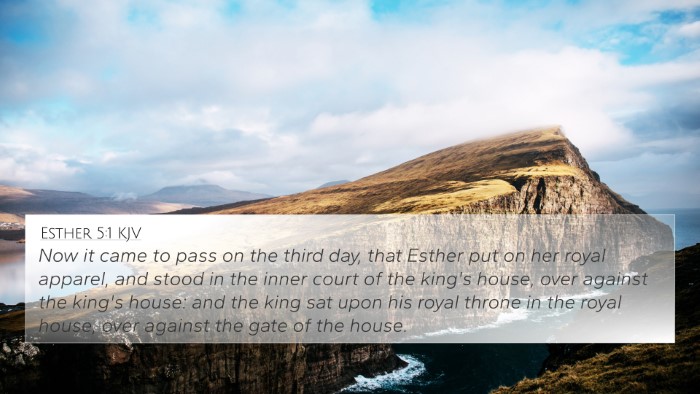
Esther 5:1 (KJV) »
Now it came to pass on the third day, that Esther put on her royal apparel, and stood in the inner court of the king's house, over against the king's house: and the king sat upon his royal throne in the royal house, over against the gate of the house.
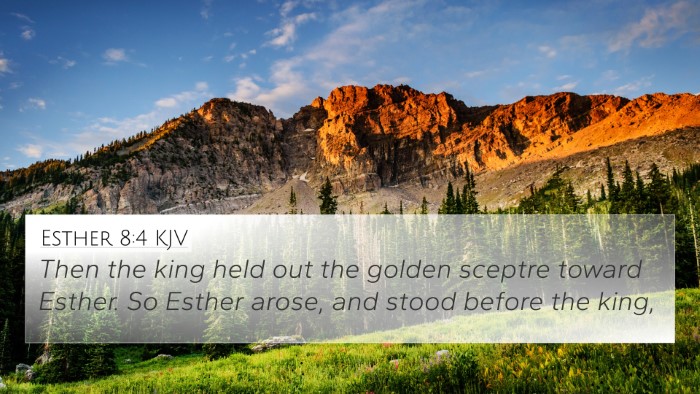
Esther 8:4 (KJV) »
Then the king held out the golden sceptre toward Esther. So Esther arose, and stood before the king,
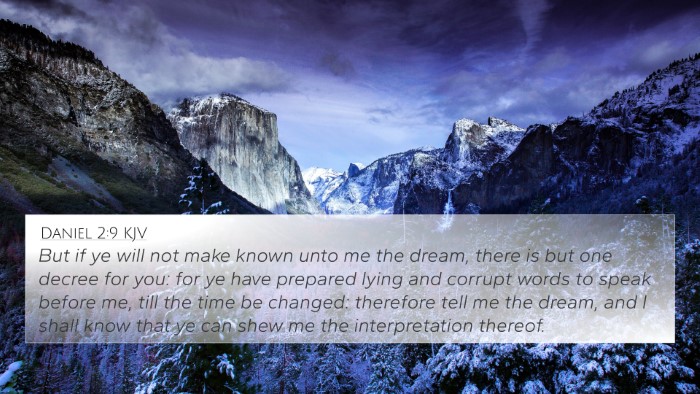
Daniel 2:9 (KJV) »
But if ye will not make known unto me the dream, there is but one decree for you: for ye have prepared lying and corrupt words to speak before me, till the time be changed: therefore tell me the dream, and I shall know that ye can shew me the interpretation thereof.
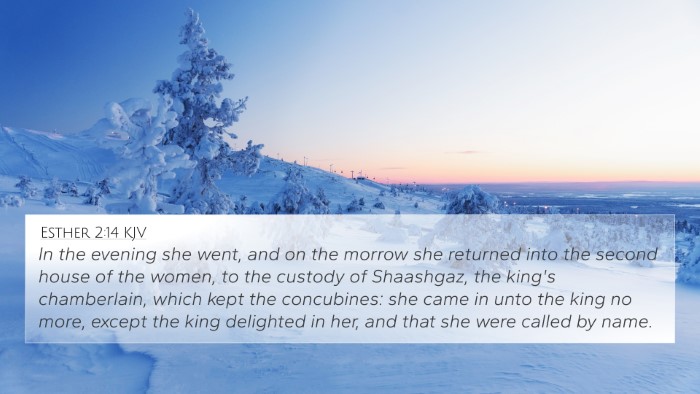
Esther 2:14 (KJV) »
In the evening she went, and on the morrow she returned into the second house of the women, to the custody of Shaashgaz, the king's chamberlain, which kept the concubines: she came in unto the king no more, except the king delighted in her, and that she were called by name.
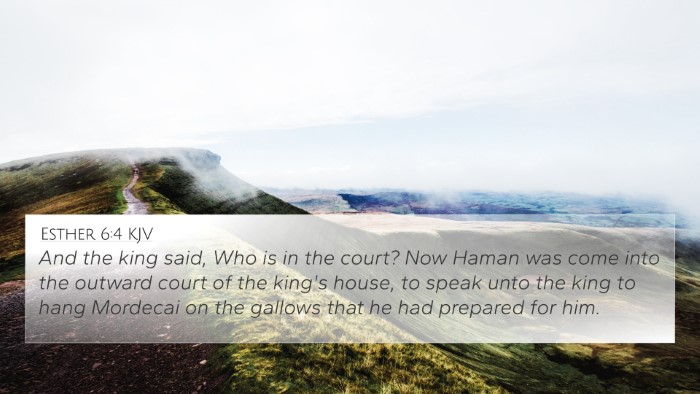
Esther 6:4 (KJV) »
And the king said, Who is in the court? Now Haman was come into the outward court of the king's house, to speak unto the king to hang Mordecai on the gallows that he had prepared for him.
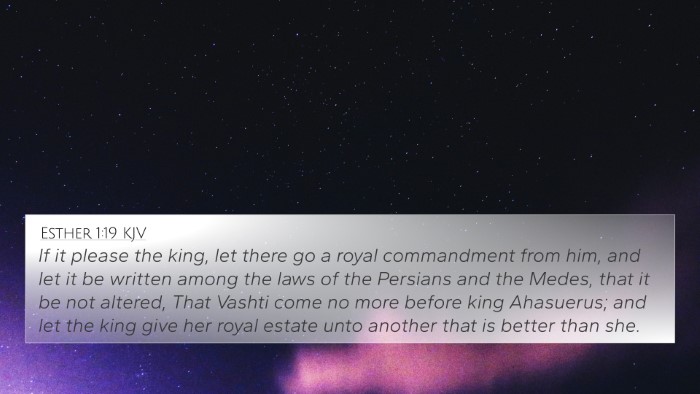
Esther 1:19 (KJV) »
If it please the king, let there go a royal commandment from him, and let it be written among the laws of the Persians and the Medes, that it be not altered, That Vashti come no more before king Ahasuerus; and let the king give her royal estate unto another that is better than she.
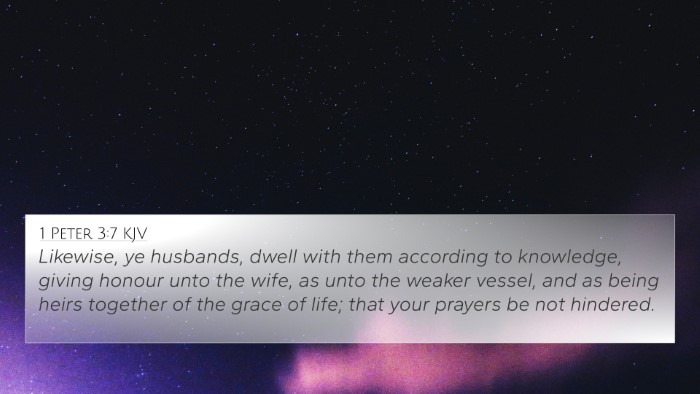
1 Peter 3:7 (KJV) »
Likewise, ye husbands, dwell with them according to knowledge, giving honour unto the wife, as unto the weaker vessel, and as being heirs together of the grace of life; that your prayers be not hindered.
Esther 4:11 Verse Analysis and Similar Verses
Understanding Esther 4:11
Esther 4:11 states: "All the king's servants, and the people of the king's provinces, do know, that whosoever, whether man or woman, shall come unto the king into the inner court, who is not called, there is one law of his to put him to death, except such to whom the king shall hold out the golden scepter, that he may live: but I have not been called to come in unto the king these thirty days."
This verse reflects the serious nature of Esther's predicament and outlines the strict protocol of approaching the king of Persia. The importance of this scripture lies in the depths of its implications regarding courage, obedience, and divine timing. Here, we explore the meaning of this verse through insights drawn from various public domain commentaries.
Summary of Insights
- Matthew Henry Commentary:
Henry explains that Esther's hesitation highlights the gravity of her mission. The law demanded immediate punishment for anyone who approached the king without an invitation. This illustrates not only Esther’s fears but also the sovereign power of the king, which serves as a metaphor for God’s authority.
- Albert Barnes Notes:
Barnes emphasizes the cultural context of the Persian court. The king’s scepter was a symbol of his grace, and its extension indicated favor. The mention of not being called for thirty days signifies Esther's predicament in navigating royal favor and the dire consequences of taking such a bold step.
- Adam Clarke's Commentary:
Clarke stresses Esther's position of vulnerability, noting that her hesitation to act was rooted in a profound understanding of the risks involved. He also points out that, while Esther was in a perilous situation, she was encouraged by Mordecai's faith in God’s plans, which reassures her of divine support.
Thematic Bible Verse Connections
Esther 4:11 resonates with several key themes in the Bible, such as courage in adversity, faith in God's providence, and the importance of standing up for one's people. Below are some pertinent cross-references that provide deeper understanding:
- Exodus 33:5: Discusses the seriousness of approaching God, echoing the sentiment of approaching the king.
- Hebrews 4:16: Encourages believers to come boldly to the throne of grace, contrasting Esther's hesitance with our access to God.
- Esther 5:1: Describes Esther's courageous act of approaching the king, showing her transformation from fear to action.
- 2 Timothy 1:7: Invites believers to embrace a spirit of power, love, and sound mind, reflecting Esther's eventual courage.
- Philippians 4:6-7: Advises not to be anxious, relating to Esther's tension about entering the king’s presence.
- Daniel 3:16-18: Illustrates Shadrach, Meshach, and Abednego’s faith in the face of death, which parallels Esther's situation.
- Matthew 10:32: Emphasizes the importance of confession before men, similar to Esther standing for her people.
Exploration of Courage in Esther 4:11
The fear embodied in Esther's words provides a strong meditation on human vulnerability, especially when faced with authority. When we study the connections between Bible verses, we see a broader narrative on trusting God even in trepidation.
This internal struggle is not just personal; it embodies a community's trust in God's faithfulness. Esther’s reluctance is relevant to Christians who face the pressures of standing for their beliefs in challenging environments.
Tools for Bible Cross-Referencing
To gain a deeper understanding of Esther 4:11 and its connections, one can utilize various tools for cross-referencing:
- Bible Concordance: A useful resource to find where specific words or themes are uniformly discussed throughout the scriptures.
- Bible Reference Resources: Allows for comparing themes and teachings across different biblical texts, enriching our understanding of Esther's narrative.
- Bible Chain References: Helps trace thematic connections, making it easier to grasp the relational dynamics within the scriptures.
Conclusion
Esther 4:11 serves as a poignant reminder of the courage required when confronting authority and standing up for one's beliefs. The insights provided by these commentaries alongside the cross-references allows for a comprehensive study of the themes of fear, bravery, and divine purpose. By employing tools for cross-referencing, one can explore how Esther's situation speaks to various principles found throughout the Bible.
